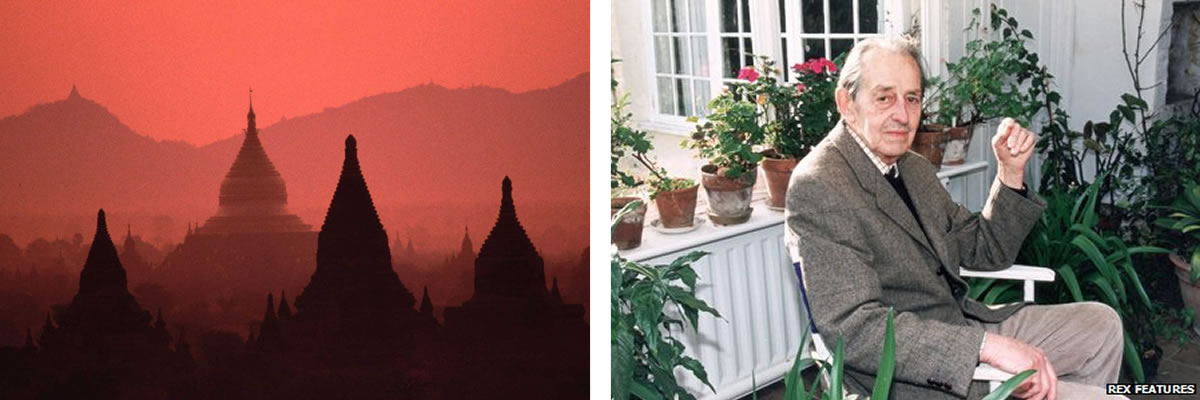Back to Homepage / Blogs / Sep 2016
Read all about it - Introducing Pandaw's best book selection with Golden Earth
As you might expect in a fleet founded by a former publisher and Southeast Asian art scholar, all Pandaw ships carry well-stocked bookshelves and libraries. Over the years many of our passengers have dipped pleasurably into these shelves, acquainting themselves even more closely with the countries whose sights, sounds and culture they are enjoying.
We thought it was time to extend the service to Pandaw "pax" by making our own recommendations of the books most likely to enhance your understanding of our destination countries. The presumption is that even a bit of prior knowledge adds immense value to the sensual experience of your expedition.
Intermittently, and in no particular order therefore, this blog will be recommending essential books on Burma, Vietnam, Cambodia, and the other great and ancient civilisations that you will encounter with Pandaw.
We're starting with one of our favourites: Golden Earth: Travels in Burma (1952) by Norman Lewis, an account of this master travel writer's journey around Burma in 1948, soon after Burma won independence from the British.
Norman Lewis (1908-2003), once described by Graham Greene as "one of the best writers, not of any particular decade, but of our century" was a highly influential if self-effacing travel writer, who revelled in the obscure, the bizarre, and the downright dangerous.
An early childhood - well described in his autobiography I Came, I Saw - in a spiritualist household made him a connoisseur of human eccentricity , which gave him a deep empathy with the minutiae of life in the "backwaters of Asia" which he travelled through in the immediate post-War decades, as well as enjoyment of being bemused and surprised by the outrageous oddness of human behaviour that few of us have time to savour.
At the time of the visit to Burma described in Golden Earth, the country was convulsed with inter-ethnic and quasi-political violence, and his solo venturing off the beaten track, despite official discouragement, exposed this World War II-hardened British Army intelligence officer to much danger as well as hilariously-described discomfort. But it enabled him to see things in Burma that few Western writers, before or since, have experienced.
Lewis was the forerunner of travel writers like Colin Thubron or Redmond O'Hanlon who made their business to research deeply, through books, but also obviously through conversation, the cultures through which he moved, and he will switch elegantly from reportage, to majestically-written and precise expositions of a point of Burmese history, religion, folklore, architecture or ethnic politics.
He is quietly but determinedly critical of British rule in Burma, and of the casual racism of all colonialism, though he notes that the Burmese – for whose special qualities he has boundless regard - were magnanimous of their former overlords. His prognosis for Burma's future was hopelessly optimistic at the time, but is particularly interesting to read now that some semblance of democracy has started to reassert itself.

Golden Earth describes such phenomena such as the Burmese sprit world of nats, its dramatic traditions, particularly around the pwe festivals, its devout Buddhism. He is very far from being starry-eyed or sentimental , and does not flinch from the implications of the Burmese Buddhist reluctance to take life, even from vermin or animals in tortuous pain, or the country's historical preference for funding pagodas rather than leper colonies. This passage about the "pious" 19th Century King Mindon's live burial of a pregnant woman to create protective spirits to guard his new capital Mandalay is characteristic, both of his comic style and of his brutal realism:
As a Buddhist scholar of renown and the leading authority of his times on Pali texts, Mindon probably disapproved of this stone-age practice. If he permitted the woman to be buried alive, he did so in the same spirit as a socialist cabinet minister might dress for dinner – not because he agreed with the principle, but because these things were expected of him; and, after all, there was nothing to be lost one way or another.
Importantly where Burma is concerned, Lewis is also very knowledgeable about the cocktail of ethnic identities comprised within this vast country's borders, and catalogues the characteristics of the Burmans, the Shans, the Kachins, the Palaungs, the Chinese, and others, also the indeterminate nature of their conflicts in the aftermath of the war against the Japanese, complicated as they wereby common banditry and the ravages of "dacoits".
Just as importantly, he is also a great observer of nature, which he rightly anticipated was about to face a sustained onslaught from modernity. He knows his birds, his trees and his flowers, and is as good at describing the accidental beauty of a jungle wilderness, the ethereal effects of butterfly swarms to description of the verminous state of some of his upcountry accommodation, the rats, the cockroaches and the venomous spiders and the pariah dogs.
Beauty and cruelty are powerfully intertwined in Lewis's world view. He is always unflinchingly truthful about the horrors of the natural world, for example describing how pigs feasted on the dead "and the dying" during the desperate and deadly Monsoon-season mountain exodus from the Japanese invasion in 1942, one of the book's most searing passages.
In short Golden Earth is book of extraordinary humanity and empathy, that concludes with an ardent hope and expectation that the Burmese would escape the excesses of Western consumerism (which Lewis relentlessly exposes to ridicule), and find their own agrarian-based route to self-determination and happiness. Six decades have now passed, during which Burma has been ruled by a military elite whose superstitions and savageries would have horrified and fascinated Norman Lewis. He captured great truths about Burma, which makes this book as impervious to time as some of the monuments he describes so surprisingly and so well.
Golden Earth: Travels in Burma by Norman Lewis (Eland Books, £12.99). Available at Amazon.